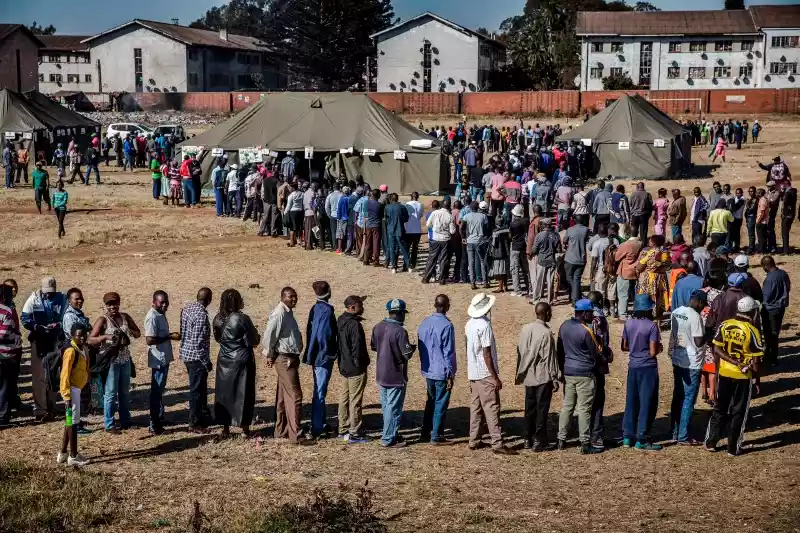
ELECTION day is considered very important for any democracy.
For Zimbabweans, August 23 was exactly that day which gave the government the chance to prove that the country is a democracy which allows its people to freely choose their leaders in a transparent, fair and credible manner.
But it fell flat on its face if we are to judge by what happened at polling stations in Bulawayo and Harare.
Yes, these two areas do not constitute the majority, but they are opposition strongholds, and so they offered a chance to government to prove its claim that it promotes democracy.
The Zimbabwe Electoral Commission (Zec) and Zanu PF are, according to their constitutions, different entities.
One is a sanctified chapter 12 independent commission created solely for the execution of elections in a fair, open and transparent manner.
The latter is a political party, which is the biggest beneficiary of any mishaps, intentionally or not, in urban areas such as the delay which occurred on election day in Harare and Bulawayo.
The Executive is made up of Zanu PF party members, among them the President and ministers who should make sure Zec is fully funded to efficiently execute its mandate.
- Electoral violence looms: ZPP
- Zimbabwe’s 2023 elections: how to judge candidates’ social protection promises
- Letter from America: Is former president Donald Trump a hero or villain?
- Chidzivo, Tarakinyu clinch Kabag honours
Keep Reading
Whether the delays in urban areas which were non-existent in the rural areas were intentional or not, I will leave it to you to judge, which will most likely depend on who you voted for on August 23.
My focus today is on the effects of the delays on elections, which may undermine our democracy.
Youth
Africa is known as the world’s youngest continent with 70% of its population under 30. Zimbabwe is no different as 77,9% of its population is aged 30 and younger, more than 60% of its population being under the age of 25.
I am not of the view that young people are not interested in politics.
They love politics in the same way a lover in a toxic relationship does; they love their partner from a distance hoping they will change, but they don't commit to save themselves from a heartbreak in case the other part does not change.
This is also supported by the fact that after women, young people are the biggest voting population in Zimbabwe, all they need to participate in an election is a little nudge.
Organisations like the non-profit ProjectVote 263 understands what it means to foster the participation of young people in a democracy by supporting them.
The Election Resource Centre is also a like-minded organisation which provided free transport to young people to go and register to vote.
Now, try to imagine a situation whereby one is encouraging a young person in 2028 to go and vote.
A young person who woke up in 2023 and stood in a queue for hours on end before eventually casting their votes late in the dead of the night, how do you think they will react?
Women
Women remain the biggest voting population in the country, making up 53,82% of registered voters.
However, we also live in a highly patriarchal society, where women are still primarily the caregivers in society.
Women must engage in domestic chores as much as they must go out and fend for their children and families.
This limits the time they can participate inother processes, especially those to do with political issues.
On August 23, women in Bulawayo had to choose either to cast their votes or go back home to take care of the family.
Zimbabwe has been on a quest to achieve gender equality; in fact it is a constitutionally-guaranteed right and whatever strides we have made in that regard were eroded by what happened on election day.
In this day and age women do not have to choose between participating in electoral processes and doing domestic chores, they should be able to do both if they so wish.
PWDs, elderly
Persons with disability make up 11% of our population, therefore, their voices through the ballot, are an important part of our democracy.
Voting stations are not suitable for sitting positions because they are usually in schools, halls, open grounds and the like.
Places where any delay in voting could expose people to harsh weather elements can make it extra uncomfortable for those who cannot stand for a long time such as the elderly and persons with disability. Mostly there are no sheds, just open grounds.
The delays disempowered persons with disability who, for instance, included persons with albinism or those who use assistive devices to walk.
The elderly walked long distances just to helplessly sit in the sun for hours on empty stomachs. This was an injustice on the part of Zec.
What happened on August 23 is a reflection of our flimsy democracy which preys on disadvantaged groups in society and ensures the cycle of poverty continues.
Tatenda Kombora is a political commentator and author. She writes here in her personal capacity.






